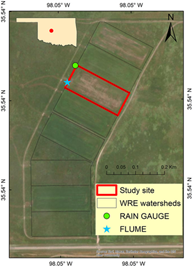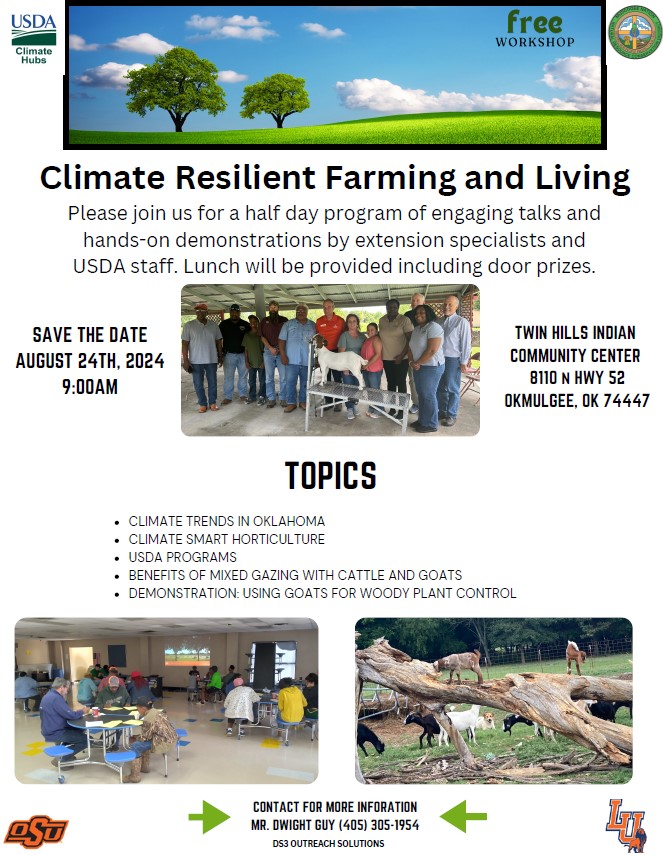Southern Plains Climate Hub Newsletter - Summer 2024
USDA releases updated greenhouse gas inventory handbook
This update ensures the report and USDA’s entity-scale GHG accounting tools continue to reflect the best available science, providing guidance to farmers, ranchers and forest
landowners interested in quantifying the GHG benefits of management changes in their operation. The guidance and tools will also help USDA assess the benefits of current and future conservation programs and initiatives.
These estimation methods are the foundation for COMET-Farm, an online farm and ranch carbon and greenhouse gas accounting system developed by USDA and Colorado State University. It helps farmers and ranchers create a farm-scale GHG inventory and provides them with a range of management scenarios that, if implemented, could reduce GHG emissions from their operations. (follow the link on the report cover image to access the full report)
Cover crops: a valuable climate adaptation tool in Oklahoma
A recent modeling study by USDA ARS scientists investigated how projected climate conditions would affect surface water flow, soil moisture, and soil erosion in the Southern Plains.
Using computer simulations, scientists studied three different farming methods: (1) continuous winter wheat under conventional tillage (baseline system), (2) continuous winter wheat under no-till, and (3) cool and warm season forage cover crop mixes under no-till. The results showed that with the baseline system, there is a projected increase in low water availability for crops, and soil erosion remains a concern. The other two systems could significantly reduce the flow of water and sediment while conserving moisture in soils. Incorporating cover crops could increase productivity and foster sustainable farming practices in Central Oklahoma. (follow the link access the full article)
Increased rates of winter wheat crop abandonment during La Niña phase of ENSO
In a study published in the latest issue of Science Advances, a team led by researchers at Kansas State University found that in La Niña years there was an increased probability of drought before planting (preseason) of winter wheat in the US Great Plains. Preseason (fall) drought was associated with greater rates of crop abandonment (the difference between acres planted and harvested) which during the recent 2022-2023 drought were comparable to the Dust Bowl years. The study suggests that strategies, such as adjusting planting schedules, selecting drought-resistant cultivars, or investing in water management strategies tailored for the preseason could mitigate the effects of these droughts and stabilize crop production. (follow the link on the image to access the full article)
Engaging with Regional Partners and Customers
The SPCH participated in the South-Central Climate Resilience Forum
The inaugural South Central Climate Resilience Forum (SCCRF) was held in Dallas, Texas from April 2-4, 2024. The Forum brought together about 250 attendees across a 5-state
region from academia, private sector, non-profit organizations, multiple levels of government, and community-based organizations. Over 100 presenters throughout 23 sessions and 7 workshops shaped the Forum through insightful and diverse content! From climate science to community engagement to nature-based solutions, we touched on many aspects of climate resilience. We enjoyed seeing everyone come together to share their research, experiences, and lessons learned and make new connections to expand their networks.
Increasing climate literacy in elementary schools of El Reno, OK
On April 4, 2024, the Southern Plains Climate Hub and our partner BlueSTEM AgriLearning Center held a Science Day at a local elementary school. The program was tailored for the 4th grade classes. We set up 7 stations and rotated about 180 students in groups of 15. The stations included: carbon cycle, water cycle, nitrogen cycle, pollinators, tree rings, bird feeders, and a rainfall simulator demonstration.
Weather trends and the economics of drought in Oklahoma
The SPCH partnered with NOAA NIDIS and OSU to hold a webinar in April 2024. Gary McManus, the Oklahoma State Climatologist, provided an overview of Oklahoma's climate, current conditions, trends, drought history, and forecasts. Then, Katie Welch, PhD candidate at Oklahoma State University, explored the economic impact of drought on rural Oklahoma and the impact of drought relief mechanisms on the economy of three Oklahoma counties. Approximately 30 participants from across the state logged on to the event. A recording of both presentations is available at the link attached to the photo.
Langston University Conference on Sustainable Agriculture, including Goats and Hair Sheep
SPCH staff gave a presentation titled ‘Climate Trends and Adaptation Resources for Oklahoma Agriculture’ and set up a booth at the Langston Conference on April 26-27, 2024. The theme of this year’s conference was, “Bringing Together Families and Food Systems”. We were able to interact with students, faculty, as well as producers from across the state of Oklahoma.
Upcoming Events
Grazing Land Management and Soil Carbon: A Climate Hubs – LTAR Webinar Series
The goal of this webinar series is to provide an update on the knowns and unknowns about the influence of grazing land management on soil carbon and nitrogen dynamics, with a strong emphasis on practical implications. Region-specific results from long-term grazing studies will be discussed by a team of recognized researchers in this field.
Upcoming Webinars are every other Monday. To register follow the link on the webinar series image.












